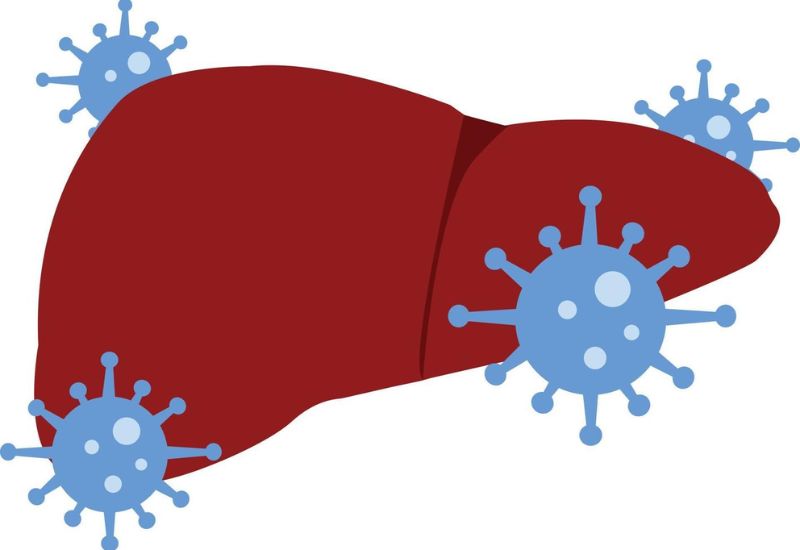Hepatitis B is a challenging and costly disease to treat, with severe complications such as cirrhosis and liver cancer. To understand more about its symptoms and prevention methods, let’s explore the following sections.
1. Understanding Hepatitis B and Its Transmission Routes
Hepatitis B is caused by the Hepatitis B Virus (HBV). The virus has an incubation period of 3 to 6 months, depending on the individual’s health. Once HBV enters the body, it can cause acute hepatitis B. If the body cannot mount an immune response against the virus, the infection can become chronic.
The primary transmission routes for hepatitis B are:
1.1. Mother-to-Child Transmission
Pregnant women infected with HBV have a high likelihood of transmitting the virus to their babies. The transmission rate is about 10% in the first trimester, increasing to 60-70% in the last trimester. Without timely intervention after birth, up to 90% of newborns can become infected. Of these, 50% may develop chronic hepatitis B, with a high risk of developing cirrhosis in adulthood.

The three primary transmission routes of hepatitis B are mother-to-child, sexual contact, and blood.
1.2. Sexual Transmission
HBV infection can be transmitted during sexual activity. The risk is higher among individuals engaging in unprotected sex or having multiple sexual partners.
1.3. Blood Transmission
In addition to mother-to-child and sexual transmission, HBV can spread through blood, specifically:
– Medical incidents such as blood transfusions or sharing non-sterile medical equipment.
– Sharing needles and personal items like toothbrushes, razors, and nail clippers.
– Using non-sterile equipment for beauty treatments, dental care, manicures, tattoos, and acupuncture.
2. What Are the Symptoms of Hepatitis B?
Early detection of HBV infection can make treatment more manageable. However, the disease often progresses silently with vague symptoms, making it challenging to diagnose early. Pay close attention to even minor changes in your body to catch the disease in its initial stages. Common early symptoms of hepatitis B include:
– Pain or swelling in the upper right abdomen
– Jaundice (yellowing of the skin and eyes)
– Dark urine
– Fatigue and weakness
– Insomnia
– Loss of appetite
– Fever lasting about a week, potentially extending to a month
– Spider angiomas (tiny, web-like blood vessels on the skin)
If you experience any of these symptoms, seek medical attention promptly to prevent complications like cirrhosis or liver cancer.
3. What Are the Complications of Hepatitis B?
If left untreated or inadequately treated, HBV can lead to several complications:
Liver Function Decline: The liver’s ability to filter blood, detoxify the body, synthesize proteins, and metabolize substances deteriorates as HBV destroys liver cells.
Fatty Liver Disease: HBV impairs the breakdown of triglycerides in the liver, disrupting fat metabolism and leading to fatty liver disease.
Cirrhosis: Untreated or poorly managed hepatitis B can progress to cirrhosis within 20 years or sooner.
Liver Cancer: During the cirrhosis stage, HBV increases the risk of malignant liver cell proliferation, potentially leading to liver cancer.

If HBV infection is not treated or treated ineffectively, it can progress to cirrhosis.
4. Preventing Hepatitis B
4.1. Vaccination
Experts recommend all newborns receive the hepatitis B vaccine within 24 hours of birth, followed by additional doses as part of routine immunization. Those who have not been infected should also get vaccinated, receiving three doses for optimal immunity (the second and third doses administered one month and six months after the first, respectively).

Everyone should get vaccinated against HBV infection, typically with a schedule of two additional doses, one month and six months after the first dose, to achieve effective immunity.
4.2. Non-Specific Prevention
Preventing HBV infection requires similar measures to those used for other bloodborne diseases:
– Screen and test blood products for HBV in medical settings.
– Avoid sharing needles and other sharp instruments.
– Practice safe sex and avoid direct contact with blood and bodily fluids from infected individuals.
4.3. Regular Liver Health Check-ups
In addition to following these preventive measures, regular liver health check-ups are crucial, even if no symptoms are present. As hepatitis B is often asymptomatic initially, early detection through clinical and diagnostic testing is vital. Vaccination and routine liver screenings can protect against HBV’s harmful effects, ensuring timely medical intervention if necessary.
By understanding hepatitis B’s transmission, symptoms, complications, and prevention, we can better protect ourselves and others from this dangerous virus.








